Book 4 Unit 2 写作 教案
《新视野英语教程(第三版)》教学资源book4Unit2-Section B

Para. 6-7
I remember I complained about the truck, but I don't remember you ever complaining when you came home tired from work and I asked you for money to go on the road again. If you did complain, I guess I didn't hear you. I was too wrapped up in my problems to think of yours.
Para. 2-3
My Darling Wife, This is a letter that no man ever wants to write, but
I'm lucky enough to have some time to say what I've forgotten to say so many t do we know about the driver’s life? She’s a beautiful, diligent and tender-hearted woman.
Intensive Reading
Para. 1
In the northern Canadian mountains, one driver was found dead in his truck after a bad snowstorm. He perhaps lived for a couple of hours until the cold got him. He had written his last letter to his wife.
大学英语Unit 2 Culture book 4
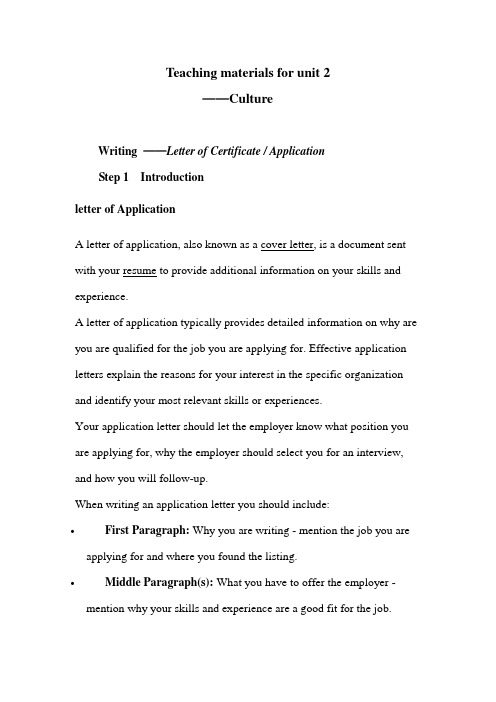
Teaching materials for unit 2——CultureWriting ——Letter of Certificate / ApplicationStep 1 Introductionletter of ApplicationA letter of application, also known as a cover letter, is a document sent with your resume to provide additional information on your skills and experience.A letter of application typically provides detailed information on why are you are qualified for the job you are applying for. Effective application letters explain the reasons for your interest in the specific organization and identify your most relevant skills or experiences.Your application letter should let the employer know what position you are applying for, why the employer should select you for an interview, and how you will follow-up.When writing an application letter you should include:∙First Paragraph: Why you are writing - mention the job you are applying for and where you found the listing.∙Middle Paragraph(s): What you have to offer the employer - mention why your skills and experience are a good fit for the job.Last Paragraph: Say thank you to the hiring manager for considering you and note how you will follow up.Sample 1Dear Sir or Madam,I have learned from an advertisement that your company is in need of a secretary. I would like you to consider me for the position.My name is Li Min. I am twenty-three years old. I am studying business management in Xiamen University. I will graduate this summer.I am familiar with computer operation and office softwares, which can help me do the office work very well. And I have learned English for ten years.In the past two years, I have been an editor for the English Paper of my department. My grades come out top in my department. What's more, I like office work very much and I also think that I can be competent for the job.If I could have the opportunity to get the job I will be quite appreciative.Thank you for your consideration. I look forward to hearing from you.Yours faithfullyLi MinSample 2Dear Sir,I have seen your advertisement in the for an assistant accountant, and should be grateful if you would consider a short account of my character and capabilities.For the last three years I have been employed as a junior accountant by a firm of import and export garment merchants where the wide field of work to be covered has given me a good all-round knowledge of accounts. To supplement my practical knowledge, I have taken evening courses of Accounting and I/E Garment in the Hong Kong City University. I feel that you could safely entrust a set of books to my care.You will find enclosed the resume and a testimonial from the Head Professor of Hong Kong City University who has kindly offered to provide you with any further details you may require.Your company is one of the top ten I/E garment company in Hong Kong. I trust that you will consider this application favorably and I wish to assure you that I should make every effort to be worthy of the confidence you may place in me.Sincerely yoursLetter of certificationA letter of certification is a letter that is used to verify previous information in written form, usually past employment. If you were looking for a new job, you would request a letter of certification from your previous employer verifying that you did work for them in the past and in what capacity.Tips for writing a letter of certification- Be clear – use exact dates as to when your employee started and finished their term of employment with you- Be explicit – state what their specific responsibilities were at your company- Include contact information – include information where the receiver of the letter can contact you for further informationSample letter of certificationSara L. Brown3146 Holden StreetMetropolis, IL 62960This letter is to certify that James Brown worked as a general accountant at Triangle corp. for the period from November 5th, 2004 to December12th, 2008.While at our company, his responsibilities were to design and implement pricing controls in relation to our line of mathematical measuring devices. Through our working relationship, I cam to appreciate the attention to detail that James showed for his work and was deeply saddened when he departed our company.I know that he will do a great job wherever you put him in you organization.Sincerely,Joseph Mancini。
新视野英语教程教案book4Unit2
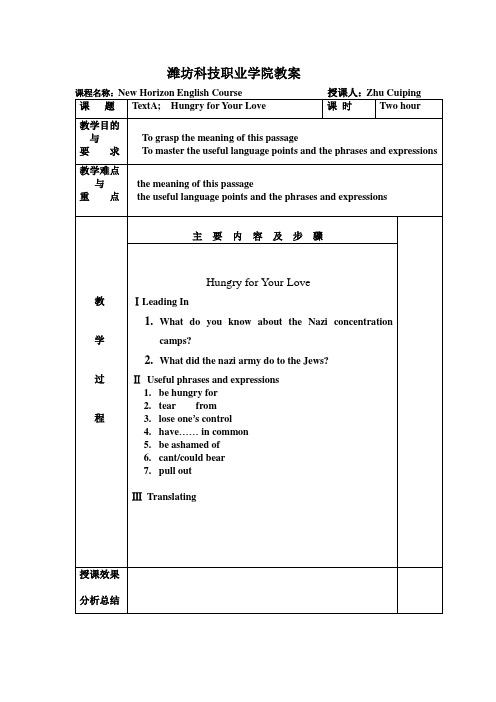
潍坊科技职业学院教案Text A Hungry for Your LoveI Detailed Study of the TextA1. I am almost dead, surviving from day to day, from hour to hour, ever since I was taken from my home and brought here with tens of thousands of other Jews.from day to day: day by day; as time goes on 一天天地;日益地The symptoms changed from day to day.症状一天天在发生变化。
The problem is getting worse from day to day.这个问题变得一天比一天糟。
from hour to hour: (of something) changing very quickly and very often (变化)快速不断地;每小时都有地The weather conditions in these mountains change from hour to hour.山间的天气情况时时在变。
2. I want to look away, oddly ashamed for this stranger to see me like this but I cannot tear my eyes from hers.Meaning:The girl, who is a stranger, looks at me like this, which shames me in a strange way. But I cannot move my eyes away from hers; I just cannot stop looking at her.oddly:adv. in a strange or peculiar manner 奇怪地;古怪地Mary looked at Tom very oddly.玛丽怪模怪样地看着汤姆。
新标准大学英语BOOK4-unit2教案-李骠
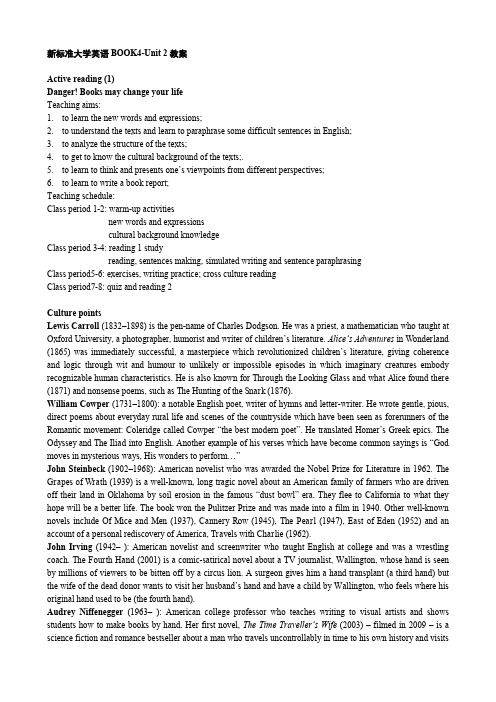
新标准大学英语BOOK4-Unit 2教案Active reading (1)Danger! Books may change your lifeTeaching aims:1.to learn the new words and expressions;2.to understand the texts and learn to paraphrase some difficult sentences in English;3.to analyze the structure of the texts;4.to get to know the cultural background of the texts;.5.to learn to think and presents one’s viewpoints from different perspectives;6.to learn to write a book report;Teaching schedule:Class period 1-2: warm-up activitiesnew words and expressionscultural background knowledgeClass period 3-4: reading 1 studyreading, sentences making, simulated writing and sentence paraphrasingClass period5-6: exercises, writing practice; cross culture readingClass period7-8: quiz and reading 2Culture pointsLewis Carroll (1832–1898) is the pen-name of Charles Dodgson. He was a priest, a mathematician who taught at Oxford University, a photographer, humorist and writer of children’s literature. Alice’s Adventures in Wonderland (1865) was immediately successful, a masterpiece which revolutionized children’s literature,giving coherence and logic through wit and humour to unlikely or impossible episodes in which imaginary creatures embody recognizable human characteristics. He is also known for Through the Looking Glass and what Alice found there (1871) and nonsense poems, such as The Hunting of the Snark (1876).William Cowper (1731–1800): a notable English poet, writer of hymns and letter-writer. He wrote gentle, pious, direct poems about everyday rural life and scenes of the countryside which have been seen as forerunners of the Romantic movement: Coleridge called Cowper “the best modern poet”. He translated Homer’s Greek epics. The Odyssey and The Iliad into English. Another example of his verses which have become common sayings is “God moves in mysterious ways, His wonders to perform…”John Steinbeck (1902–1968): American novelist who was awarded the Nobel Prize for Literature in 1962. The Grapes of Wrath (1939) is a well-known, long tragic novel about an American family of farmers who are driven off their land in Oklahoma by soil erosion in the famous “dust bowl” era. They flee to California to what they hope will be a better life. The book won the Pulitzer Prize and was made into a film in 1940. Other well-known novels include Of Mice and Men (1937), Cannery Row (1945), The Pearl (1947), East of Eden(1952) and an account of a personal rediscovery of America, Travels with Charlie (1962).John Irving (1942–): American novelist and screenwriter who taught English at college and was a wrestling coach. The Fourth Hand (2001) is a comic-satirical novel about a TV journalist, Wallington, whose hand is seen by millions of viewers to be bitten off by a circus lion. A surgeon gives him a hand transplant (a third hand) but the wife of the dead donor wants to visit her husband’s hand and have a child by Wallington, who feels where his original hand used to be (the fourth hand).Audrey Niffenegger (1963–): American college professor who teaches writing to visual artists and shows students how to make books by hand. Her first novel, The Time Traveller’s Wife (2003) – filmed in 2009 – is a science fiction and romance bestseller about a man who travels uncontrollably in time to his own history and visitshis wife in her childhood, youth and old age. His wife needs to cope with his absences and dangerous life while he travels. The story is a metaphor for distance and miscommunication in failed relationships.Paul Torday (1946– ): a British busines sman who worked for a company that repaired ship’s engines for many years. Salmon Fishing in the Yemen (2007) was his first novel. It is a political satire and comedy about a dull civil servant who becomes involved in a plan to populate the desert with Scottish salmon. Politicians manage the media to “spin” this as a plan they support in order to divert attention from problems in the Middle East. There are themes of cynicism and belief, and East-West culture clashes.Aleksandr Solzhenitsyn (1918–2008): a Russian writer who was imprisoned in Soviet labour camps in 1945; after eight years, he was exiled to Kazakhstan and not freed until 1956, when he became a teacher. In 1970 he was awarded the Nobel Prize for Literature but not receive it until 1974. He went to Germany, Switzerland and the USA, returning to Russia in 1994. His best known novels were based on his experiences as a prisoner and include: One Day in the Life of Ivan Denisovich (1962), Cancer Ward (1968), The Gulag Archipelago (1974–1978). His later works were about Russian history and identity.Graham Greene (1904–1991): a British novelist, short-story writer, playwright, travel writer and essayist. He wrote a number of thrillers (he called them ‘entertainments’) which dramatize an ambiguous moral dilemma, often revealing guilt, treachery, failure and a theme of pursuit. Greene was also a film critic and all of these novels have been made into films: Brighton Rock (1938), The Power and the Glory (1940), The Heart of the Matter (1948), The Third Man (1950), The Quiet American (1955), and Our Man in Havana (1958).E. M. Forster (1879–1970): a British novelist and writer of short stories and essays. He lived at different periods in Italy, Egypt and India and taught at Cambridge University. His best known novels include A Room with a View (1908), Howard’s End (1910), A Passage to India (1924) which have all been made into films. His writing about reading and writing includes a book of lectures, Aspects of the Novel (1927).Thomas Merton (1915–1968): an American Catholic writer, who was a Trappist monk in Kentucky. He wrote over 70 books, including many essays about Buddhism and a translation into English of the Chinese classic, Chuang Tse. He had a great deal to say about the meeting of Eastern and Western cultures and wrote many letters to writers, poets, scholars and thinkers. He read a lot in English, Latin, French and Spanish and said he always had at least three books which he was reading at any one time.William Blake (1757–1827): a British poet, artist and mystic, who read widely in English, French, Italian, Latin, Greek and Hebrew. He made many engravings to illustrate the work of such writers as Virgil, Dante and Chaucer, as well as his own poems. He stressed that imagination was more important than rationalism and the materialism of the 18th century and criticized the effects of the industrial revolution in England, but his work was largely disregarded by his peers. He is best known for his poetry in Songs of Innocence (1787) and Songs of Experience (1794). His belief in the oneness of all created things is shown in his much-quoted verse, “To see the world in a grain of sand / And a heaven in a flower, / Hold infinity in the palm of your hand / And eternity in an hour.”Clifton Fadiman (1904–1999): an American writer, radio and TV broadcaster and editor of anthologies. For over 50 years he was an editor and judge for the Book-of-the-Month Club. In 1960 he wrote a popular guide to great books for American readers, The Lifetime Reading Plan, which discusses 133 authors and their major work: the 1997 edition includes 9 authors from China.J. K. Rowling (1965–): British writer of the seven Harry Potter fantasy books. She studied French and Classics at Exeter University, before teaching English in Portugal and training to teach French in Scotland. The main idea about a school for wizards and the orphan Harry Potter came on a delayed train journey from Manchester to London in 1990. She began to write as soon as she reached London. Twelve publishersrejected the first book before Bloomsbury, a small London publisher, agreed to publish it. Later books have repeatedly broken all the sales records (as have some of the films). She is one of the richest women in the UK and a notable supporter of many charities.Language points1 Variety’s the very spice of life, / That gives it all its flavour … (Para 2)Spices are made from plants and added to food to give it its particular flavour or taste. The English proverb “Variety is the spice of life” (the proverb comes from Cowper’s poem) therefore means that variety gives life extra value and allows you to appreciate life in particular ways.2 We learn to look beyond our immediate surroundings to the horizon and a landscape far away from home. (Para 3)This means that through reading we learn to look beyond our immediate experience or familiar environment to things beyond our immediate experience, ie to completely different things that we can imagine and experience through books.3 When a baseball player hits a home run he hits the ball so hard and so far he’s able to run round thefour bases of the diamond, and score points not only for himself but for the other runners alreadyon a base. (Para 9)In the American game of baseball, the field of grass is diamond-shaped and has four bases (specific points marked around the diamond), round which players must run to score points. One team bats (ie team members take turns to hit the ball and run round the bases) and the members of the other team throw (pitch) the ball and, when it is has been hit, try to catch it or get it quickly to one of the four bases. If a batting player can hit the ball hard enough, he can run round all four bases before the other team can get the ball and thus score maximum points – with a home run. In the passage, a really good book is a home run.3 Choose the best answer to the questions.1 Why are we like Alice in wonderland when we read a book?(a) Because, like Alice, we often have accidents.(b) Because reading makes us feel young again.(c) Because reading opens the door to new experiences.(d) Because books lead us into a dream world.2 According to the writer, what is the advantage of reading over real life?(a) There is more variety in books than in real life.(b) We can experience variety and difference without going out of the house.(c) The people we meet in a book are more interesting than real people.(d) It’s harder to make sense of real life than a book.3 What do the seven novels listed in Paragraph4 have in common?(a) Their titles stimulate imagination.(b) They represent the best writing by British and American novelists.(c) They have become classics.(d) You can find all of them in any local library.4 At what moment in our lives do books become important?(a) As soon as we start reading.(b) When we start buying books to fill our shelves at home.(c) When we start listening to bedtime stories.(d) Only when we are ready for books.5 What claim did Merton make about the poems of William Blake?(a) They were similar to the works of the Greek writers and thinkers.(b) They helped him understand the meaning of life.(c) They created a sense of confusion.(d) They taught him a lot about modern culture.6 What is meant by a home-run book?(a) A book which is so good you are unable to put it down.(b) A book that the whole family can enjoy.(c) A children’s book that is read and appreciated by adults.(d) A book that hits hard like a home run in the game of baseball.Dealing with unfamiliar words4 Match the words in the box with their definitions.1 to make someone feel that they do not belong to your group (exclude)2 to fail to do something that you should do (neglect)3 to mention something as an example (cite)4 to be strong enough not to be harmed or destroyed by something (withstand)5 in most situations or cases (normally)6 to be about to happen in the future (await)5 Complete the paragraph with the correct form of the words in Activity 4.When I lived in Britain, one of my favourite radio programmes was ca lled “Desert Island Discs”. The format was always the same: Guest celebrities were asked to imagine they had been washed ashore on a desert island, and had to choose nine books – (1) excluding the Bible and Shakespeare, which they were already provided with – to take with them to the island, to help them (2) withstand the physical and mental isolation. I sometimes like to think which books I would take. (3) Normally, like most people, I don’t have much time for reading, and I could (4) cite dozens of books which I have never read but which I w ould like to. It’s an opportunity I have (5) awaited all my life, in fact. But what would I choose? Mostly novels, probably, but I wouldn’t (6) neglect to include a volume or two of poetry. My first choice, I think, would be Tolstoy’s War and Peace. I’ve never read it, but I’m ready to believe that it is one of the most marvelous books ever written.6 Replace the underlined words with the correct form of the words in the box.1 In a good novel, the writer and reader communicate with each other. (interact)2 I have to face up to the problem sooner or later. (confront)3 I read the book in one sitting and Mary did too. (likewise)4 E. M. Forster was one of the most important and respected British novelists of the 20th century. (influential)5 Do you believe that a work of literature can actually lead to social changes? (induce)6 Robert Burns was a great poet who wrote in the language variety spoken in Scotland. (dialect)7 The Time Traveller’s Wife is the story of a man who has a strange and inexplicable genetic disorder. (mysterious)7 Answer the questions about the words.1 If you have had a disconcerting experience, do you feel a bit (a) tired, or (b) confused?2 If you have a vista of something, can you (a) see or imagine it, or (b) go and visit it?3 Would you express great wrath by (a) smiling at someone, or (b) shouting at them?4 If you feel enchanted by a book, do you (a) like it a lot, or (b) not like it at all?5 Is a writer who is supremely talented (a) very good, or (b) quite good at his job?6 If reading fosters an understanding of certain problems, does it (a) help understanding, or (b) prevent it?7 If you are desperately trying to get a job, are you (a) trying very hard to get it, or (b) caring littlewhether you get it or not?8 Is a sensation (a) a certainty, or (b) just a feeling?Reading and interpreting8 Check () the writer’s main purpose in writing the passage.1 To show the reader how to read fiction.2 To suggest that fiction is more powerful than non-fiction.√ 3 To persuade the reader that reading can be a life-changing experience.4 To claim that books provide the meaning to life.5 To recommend some major novels to read.9 Work in pairs. Look at the statements from the passage and discuss the questions.1 … when we pick up a book we are about to enter a new world.Do you agree with this statement? Is this true of every book?I agree with this up to a point, but it is not true of every book because with some books you may already be very familiar with the world of those particular books so although you might read them, they wouldn’t take you to a new world.2 We’ll have experiences which are new, sometimes disconcerting, ma ybe deeply attractive, possibly unpleasant or painful, but never less than liberating from the real world we come from. How can reading be a “painful” experience? In what sense does reading “liberate” us from the real world?It is easy to imagine how reading could be a painful experience for some people: It depends on the book and on the reader’s background and personal ity. For instance, I can see that a story about bullying, might be painful to read if you were bullied when you were a child – it would remind you of the experience of being hurt.Reading can liberate us because in books we can have all sorts of wonderful and interesting experiences which would be impossible for us in the real world: we can travel to distant places or go anywhere in time, we can meet all sorts of people we probably wouldn’t meet anywhere else except in books.3 Reading books allows us to enjoy and celebrate this variety and difference in safety, and provides us with an opportunity to grow.How does this idea contrast with the title of the passage? In what way can a book help us “grow”? The word “Danger” in the title contrasts with this idea that reading is a safe experience. However, this is not a contradiction because experiences that would be dangerous in real life are quite safe when we read about them in books. The author seems to think that we grow in our minds with a better understanding and enriched imagination when we meet a wide variety of people and different situations in books. This vicarious experience in reading is a safe way to grow mentally and emotionally.4 To interact with other people’s lives in the peace and quiet of our homes is a privilege which only reading fiction can afford us.Do you agree? Is fiction really different from other types of writing?Well, I think this is true because in fiction we do interact with the characters, both positively (with characters we can identify with) and negatively (with characters we do not like or admire). But this doesn’t mean that we don’t interact with the writer in non-fiction. Surely all of us have the experience of feeling that we do interact with writers in newspaper or magazine articles and in some kinds of non-fiction which may be about science, for example. I suppose it depends on the style of the writing and on the personality of the writer (and of characters in fiction) and on us, as readers.5 We even understand … that we h ave more in common with other readers of books in other cultures than we might do with the first person we meet when we step out of our front doors.This suggests that people who read are different from people who don’t read. Do you agree? Well, I am not sure. I guess that people who read similar books, fiction or non-fiction, would share some common knowledge, experience and maybe feelings and they would probably talk about these when they know about each other’s reading habits. Of course, they wouldn’t ne cessarily have other things in common, just this particular connection with a certain kind of culture through reading. Maybe people in the street do not have to share this reading experience, so in that respect they are different, but they may be quite similar and share many cultural experiences in other ways –after all they live in the same place, probably speak the same language. So, I think it’s all a question of what sort of common experiences you are talking about. The more I think about it, the less I agree!6 From the bedtime story read by a parent to their child all the way through to the sitting room lined with booksin our adult homes, books define our lives.What do you understand by “books define our lives”?I suppose they would be those books – not many, surely? – which have made a great impact and remain so strong in our memories that do have a function of defining something in our lives. However, I think the author has exaggerated here. Books are not the only things that define our lives. People, places and special events define our lives too, so books are only one part which for some people have a great influence but for others maybe very little or none at all. We have to remember that some people simply don’t read books. Even some students on ly read what they have to read, nothing more than that!7 We cannot withstand the hunger to visit another world, to meet different people, to live other lives and to reflect on ourselves.Do you agree that we “live other lives” when reading? Or is this an exaggeration?I agree that we have strong imaginative experiences when we read. Maybe you can call this “living other lives” sometimes, but for me, anyway, this simply doesn’t happen very often and when it does happen it is only for a short time. I think the writer is exaggerating here to make the point that reading has importance in our imagination.8 Books may change your life.Is this a suitable title – and ending – for the passage? Why / Why not?Yes, I think it OK as a catchy title – it gets our attention, after all, and repeating it at the end makes a kind of coda like the ending of a piece of music which echoes something near the beginning. Also if you look carefully, it does have a note of caution by using “maybe” instead of “will”, so this title isn’t a definite promise, it’s more of an attractive idea, that your life may be changed through books, but might not be.Now discuss which of the above statements would have been more effective if backed up byexample(s).In fact, it seems that any of them could effectively be illustrated by examples, but if all of them were to be backed up with examples, the whole passage would be a lot longer and maybe too heavy with examples.If I had to choose just two statements which need supporting examples, I would say numbers three and six because I’d say the ideas about ‘growing’ through books and books ‘defining’ our lives are too vague without examples.Active reading (2)They were alive and they spoke to meBackground informationThis is from The Books in My Life by Henry Miller (1861–1980), an American novelist, writer and painter. Miller was born in New York, lived in Paris 1930–1939, and then in California. His best-known works blend fiction, autobiography, social criticism and mysticism: Tropic of Cancer (1934 published in France) describes his life and loves in Paris and because of its sexual frankness it was not published in the USA till 1961; Black Spring (1936) has ten autobiographical stories; Tropic of Capricorn (1939) is about his years with the Western Union Telegraph Company; The Colossus of Maroussi (1941), considered by some critics to be his best work, is a travel book about people from his stay in Greece.In The Books in My Life (1969) Miller looks at 100 books that influenced him. His list includes children’s books written originally for adults (eg Alice in Wonderland, The Arabian Nights, Greek Myths and Legends, Robinson Crusoe, The Three Musketeers); many French novels and poetry (eg by Balzac, Hugo, Giono, Nerval, Proust, Rimbaud, Huysmans, Maeterlinck), German novels (by Mann, Hesse, Dreiser) and the Chinese Lao Tse and Fenollosa’s The Chinese Written Character as a Medium for Poetry, besides work by American writers (Twain, Emerson, Thoreau, Whitman), Dostoievshy, Nietzsche, Joyce and writers on spiritual topics.Culture pointsAugust Strindberg (1849–1912): A Swedish playwright and a prolific writer of novels, short stories, satires, essays and poems, and a photographer, who tried various jobs before becoming assistant librarian at the Royal Library in Stockholm and established an experimental theatre. He is best known for his plays, including The Father (1887) and Miss Julie (1888), and for his vitality, vigour, and brilliant use of language. Miller cites Strindberg’s autobiographies, The Confession of a Fool (vol.2), a passionate love story and account of problems in his marriage, and The Inferno (vol.3), a study of his religious conversion, delusions and neuroses which reflect Strindberg’s periods of mental instability.Blaise Cendrars (1887–1961) is the pen name of Frédéric Sauser, a Swiss-born French novelist, shortstory writer, poet, and film-maker, who led a life of constant travel (he was born in an Italian railway train) doing various jobs in Russia, Europe, North and South America and Asia – he is said to have shoveled coal on steam trains in China. He lost his right arm fighting for France in World War I. His prose includes vivid, witty, action-packed novels, like Moravagine (1926), which describe travel and adventure, or works directly inspired by his own experience, like The Astonished Man (1945) and The Cut Hand (1946), and four volumes of memoirs. Miller admired his work and lists ‘virtually the complete works’ of Cendrars as influential reading.Rémy de Gourmont (1858–1915): a French writer of 50 books: essays, novels and poetry, with a strong interest in medieval Latin literature; as a critic he was admired by T. S. Eliot. He was a librarian at the National Library in Paris; later, a painful skin disease kept him largely at home. He was influential in the symbolist movement in literature. He claimed that a work of art exists only through the emotion it gives us. He asserted the need to get away from the unquestioning acceptance of commonplace ideas and associations of ideas, and believed it was necessary for thought to proceed by imagery rather than by ideas.Julius Caesar (110 BC–44 BC): a Roman statesman, known as a great military strategist. As a general he was famous for the conquest of Gaul (modern France and Belgium) which he added to the Roman Empire. He also made two expeditions to Britain, was governor of Spain and traveled in North Africa and Egypt. He was a good speaker and he wrote several books of commentaries and memoirs on Roman wars and military campaigns. Caesar’s writin g is often studied today by those who learn Latin.The Julius Caesar of literature: this phrase compares Cendrars with Caesar: both were men of action, travelers, adventurers, explorers, who somehow found time to read a lot and write books.Language points1 The fact, however, that in the past I did most of my work without the aid of library I look upon asan advantage rather than a disadvantage. (Para 1)This is irony. Miller is writing about the importance of reading and about key books in his life, but there is a paradox: Only recently has he been able to get all the books he has wanted all his life (ie he now has money, as a best-selling writer, to buy books) and, as a writer, he wrote books without the help of a library. He says that not having books wa s an advantage. The explanation is probably that Miller’s early writing was a mixture of autobiography and fiction, so he didn’t need to read other books or refer to them to do his own writing. The irony is that he is saying this in a book about the books the influenced him.2 A good book lives through the passionate recommendation of one reader to another. (Para 3)Miller thinks that a good part of the ‘life’ of a book is how one reader recommends it to another with enthusiasm, ie books are about sharing e xperience, not just the author’s experience in the book and the reader’s experience of reading it, but also the experience of word-of-mouth or face-to-face recommendation by other readers.3 And the better the man the more easily will he part with his most cherished possessions. (Para 4)This continues Miller’s thought that books are for sharing. A good person will share things he or she loves. In this case, such a person will give or lend favourite books and such generosity makes friends: When you give books you get friendship.4 If you are honest with yourself you will discover that your stature has increased from the mereeffort of resisting your impulse. (Para 6)Miller’s argument here is that you should not read everything, but that you should choose ve ry carefully and selectively. This means you should resist the temptation to read some things which are not really going to add to your knowledge or enjoyment (not every book will do this, only some). Here, he says that in this way, we grow (we “increase our stature”). That is, we grow by not reading many books. The implication is that if we choose the very best books and read these few really carefully we will get the best from them – and grow by such selection. Miller discusses 100 books which he things are such books.5 All on the side, as it were. (Para 7)Cendrars was a man of action who spent most of his time on travels and adventures. Surprisingly (you would think he did not have time), he read a lot in different languages and even wrote many books – this was in addition to his main activities.6 For, if he is anything, Cendrars, he is a man of action, an adventurer and explorer, a man who has known how to “waste” his time royally. (Para 7)Cendrars had a huge reputation as a man of action, travelling, having adventures and exploring different countries and yet he read a lot (he knew how to use the little time available to read). “Waste” is in quotes to show irony (reading isn’t a waste of time), that he reads in a royal manner (ie very thoroughly). The sentence structure here is quite French with the repetition of “he”.Reading and understanding2 Choose the best answer to the questions.1 What does Miller consider to have been an advantage during his writing career?(a) To have been able to read all the books he wanted.(b) To have grown up in a room full of books.(c) To have written without the aid of a library.(d) The fact that he never wanted to own any books.2 What did three stars on a book mean in the public library in Miller’s youth?(a) Young people weren’t allowed to read them.(b) They were the most popular books in the library.(c) They were intended for children.(d) They were more exciting than one-star books.3 Why does Miller hope the star system still exists in public libraries?(a) It is an efficient system which works well.(b) It discourages people from reading inappropriate books.(c) It makes people interested in reading.(d) It makes it easier for people to recognize books.4 Why do people lend books, in Miller’s opinion?(a) Because they feel the need to share their feelings.(b) It’s the best way to make a friend.(c) It’s less risky than lending money.(d) Because it’s not possible to possess a book for ever.5 According to Miller, what should you do when you find a book you want to read?(a) Pick it up and start reading.(b) Ask a friend for advice about the book.(c) Think about whether you really need to read it.(d) Only read it if it is original.6 What does Miller especially admire about Blaise Cendrars?(a) He had a very adventurous life.(b) He was a great writer.。
Book4 Unit2 语言运用导学案
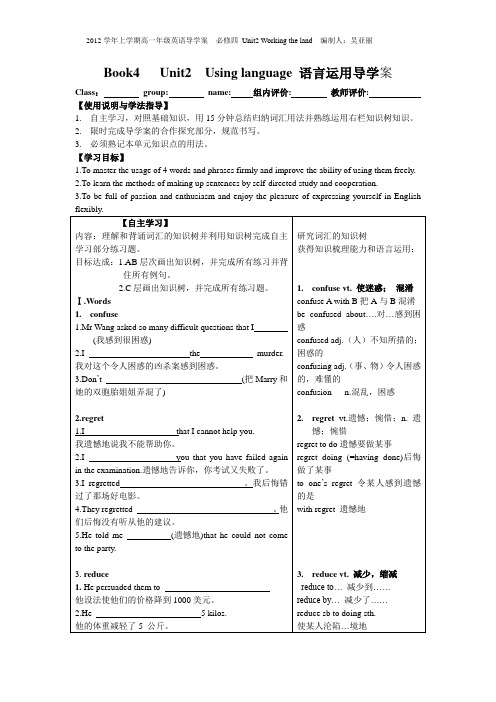
Book4 Unit2 Using language 语言运用导学案Class:group: name: 组内评价: 教师评价:【使用说明与学法指导】1.自主学习,对照基础知识,用15分钟总结归纳词汇用法并熟练运用右栏知识树知识。
2.限时完成导学案的合作探究部分,规范书写。
3.必须熟记本单元知识点的用法。
【学习目标】1.To master the usage of 4 words and phrases firmly and improve the ability of using them freely.2.To learn the methods of making up sentences by self-directed study and cooperation.3.To be full of passion and enthusiasm and enjoy the pleasure of expressing yourself in English【合作探究】内容:利用本节所学的词汇,短语或句型完成下列练习,提高在语境中灵活运用的能力。
1.All the energies are on children and she seemed to have little time for anything else.A.guidedB.aimedC.directed D focused2.we firmly belive that war never settles anything. It only violence.A.runs intoes fromC.leads toD.begins with3.You must your speed when you come to the traffic lights.A.expandB.reduceC.increaseD.prevent4.Taking some exercise every day will your health.A.make upB.take upC.set upD.build up5.The professor is making some about the current economy,which refers to the share market.A.achievementsB.ambitionmentsanizations6.The Libyan issue has noe become the of worldwide media attention.A.discoveryB.focusC.rootD.argument7._The cars give off a great deal of waste gas into airYes ,but I’m sure something will be done to the air pollution.A.reduceB.removeC.collectD. warn8. Children’s curiosity may many useful inventions。
《新视野英语教程(第三版)》教学资源book4Unit2-Section A

triumph quickly throws the apple over the fence. I run to pick it
up, holding it in my frozen fingers. In my world of death this
Book 4 Unit 2 Working the land 语法

随堂练习
单句改错。
1. Learn Chinese in an English-speaking
A
B
country is not an easy job. A.Learn→Learning
C
用所给的词的恰当形式填空。
1. Tom is very stubborn, so it is no use _a_r_g_u_in_g___ (argue) about it. 2. _N__o_t _kn_o_w__in_g__(know) how to swim can put you in danger when you suddenly find yourself in water. 3. There is no __d_e_n_yi_n_g__ (deny) that China has played an very important role in international trade.
常跟动词ing作宾语的动词歌诀:
consider, suggest / advise, look forward 考虑建议盼原谅,to, excuse, pardon 承认推迟没得想,admit, delay / put off, fancy 避免错过继续练,avoid, miss, keep /keep on, practise 否认完成停能赏,deny, finish, stop, enjoy / appreciate 不禁介意准逃亡,can’t help, mind, allow/ permit, escape 不准冒险凭想象。forbid, risk, imagine
afford, agree, arrange, choose, decide, hope, expect, offer, plan, promise, determine, demand, manage, fail, prepare, refuse, pretend, seem
新视野第三版Book4Unit2ASecretstobeauty
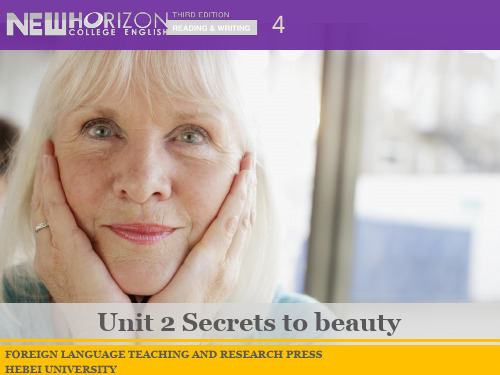
Inspiring your thoughts
Project of the unit
Lead-in
Project forecasting
Project of the unit
J
The love of beauty is universal. The pursuit of beauty is everlasting, especially for women. We have found various ways to improving our physical appearances. Do these effort, however, necessary? By the end of this unit, you are expected to air your opinion on the following topic in a debate:
They spend great efforts on details of appearance only to expose themselves to criticisms by other women.
Inspiring your thoughts
Detailed understanding
Project of the unit
Why are plastic surgery so popular among those young girls? • boost one’s chances of getting a more satisfactory job; • feel more confident; • attract a more desirable spouse.
1. Do you often beautify your pictures with certain software or App? Why or why not?
新视野大学英语(第三版)读写教程Book-4-Unit-1教案
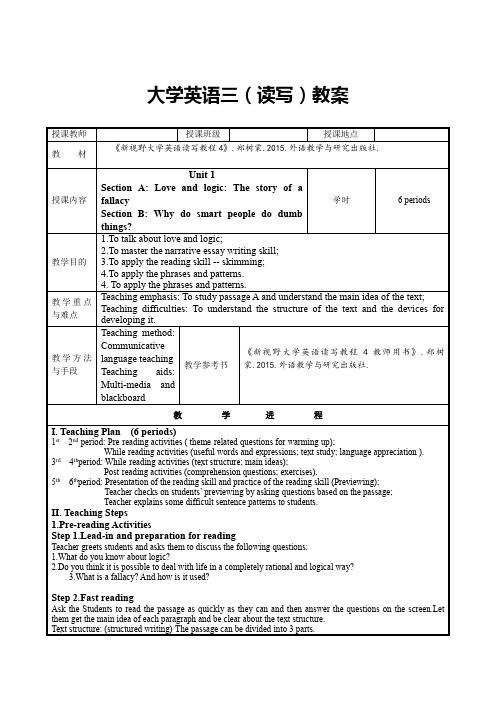
大学英语三(读写)教案10)ingenious a.good at inventing things and solving problems in new ways (人)有独创性的They are attacking the honest and ingenious scientist because his ideas are new.他们攻击这位诚实并富有独创能力的科学家, 是因为他的观点新颖。
2 .While-reading ActivitiesStep 4.Intensive readingStudents are asked to read the passage carefully again and answer some detailed questions on the screen.During the reading, there is an explanation for the following points:Language Points:1.That year every guy on campus had a leather jacket, and Rob couldn’t stand the idea of being the onlyfootball player who didn’t, so he made a pact that he’d give me his girl in exchange for my jacket.(Para.1)Meaning: That year every young man in the college wore a leather jacket.Rob was the only one in the football team who didn’t have one.He felt frustrated whenever he thought about it, so he made an agreement with me that if I gave him my leather jacket, he would, as an exchange, give me his girlfriend.2.make a pact: 达成协议in exchange for: 作为(对...的)交换3.If I could show the elite law firms I applied to that I had a radiant, well-spoken counterpart by my side, Ijust might edge past the competition.(Para.2)Meaning: When looking for a job, if I could show the top law companies that I had a partner who was not only beautiful but also intelligent and polite, I might well be able to gain an advantage over mycompetitors and successfully get a job offer.3. “Radiant”she was already.I could dispense her enough pearls of wisdom to make her “well-spoken”.(Para.3)Meaning: She was already very beautiful.And I could teach her to speak intelligently so that she would sound very pleasant and smart when she speaks.Meaning beyond words: The word “dispense”, which means “give sth.to people”, shows that the narratorregards himself far superior to the girl.He is again boasting and praising himself.The word shows hisarrogance and conceit.4.After a banner day out, I drove until we were situated under a big old oak tree on a hill off the expressway.(Para.4)Meaning: After spending an excellent day out with her, I drove my car to a hill by the highway.I stopped when we were under a big old oak tree.5.banner a.极好的;非常成功的n.横幅;横幅标语She seemed to have a good time.I could safely say my plan was underway.I took her home and set a date for another conversation.(Para.15)Meaning: It seemed that she had enjoyed my logic lesson very much.I was pretty sure that my plan was going on smoothly.I drove her home and decided on a date for our next meeting.underway 在进行中set a date for 为.....定日期 e.g.They will set a date for the wedding.6. “The situations are altogether different.You can’t make an analogy between them”.(Para.24)Meaning: The situations are totally different.You can’t make a comparison between them.Make/ draw an analogy between: 在.....之间作类比E.g.It is difficult to make an analogy between cars and airplanes.把汽车和飞机进行类比是很难的。
全新版21世纪大学英语读写教程4---Unit2(同名2347)

Unit 2 Silent Struggle
全新版21世纪大学英语读写教程BOOK 4
Video script:
Hi Class,
Is the American Dream still ringing in your ears1? Hopefully, this question brings you to the threshold2 of Unit Two.
Unit 2 Silent Struggle
全新版21世纪大学英语读写教程BOOK 4
It is hard to tell, isn’t it? Geographically4, the Pacific Ocean serves as the long distance that makes visits extremely difficult. As it is5, the parents are living in what is called “empty nest6’’ and they tend to suffer from “empty nest syndrome”, which is generally accepted as the lonely, abandoned feeling of the home being empty.
I_t_i_s_a__s_il_e_n_t_s_t_ru_g__g_le__in__th__is__n_a_ti_o_n__o_f _im__m__ig_r_a_n_t_s_.
Unit 2 Silent Struggle
全新版21世纪大学英语读写教程BOOK 4
Now that the students have fully understood the Video Starter, you can ask some of them to dub the video, if time permits. Correct their errors in pronunciation and intonation.
外研版小学英语五年级上册4Unit 2 What’s the matter with Daming_教案

Module4 Unit2 What’s the matter with Daming? 教学设计一、课标解读本课是五年级上册第四模块的第二单元,课程目标应针对本课具体教学内容结合课程标准的二级目标描述来确定。
语言知识和语言技能目标要求:了解简单的拼读规律;能在图片、图像、手势的帮助下,听懂简单的话语或录音材料;能听懂简单的配图小故事;能听懂课堂活动中简单的提问;能认读所学词语;能根据拼读的规律,读出简单的单词情感态度及文化意识目标要求:1、能体会到英语学习的乐趣;2.敢于开口,表达中不怕出错误;3. 乐于感知并积极尝试使用英语;4.积极参与各种课堂学习活动;5.在小组活动中能与其他同学积极配合和合作;6.遇到困难时能大胆求助。
学习策略目标要求:积极与他人合作,共同完成学习任务;主动向老师或同学请教;制订简单的英语学习计划;对所学习内容能主动练习和实践;在词语与相应事物之间建立联想;学习中集中注意力;积极运用所学英语进行表达和交流。
二、教材分析本单元由两部分组成,第一部分内容是Ben和Lili的对话,运用的是第一单元所学的句型What’s the matter?答句是用第一人称。
这一部分的单词和句型都是学生以前熟悉的,因此只是作为一个导入,用来引入第二部分的What’s the matter with Daming?中的第三人称的变化。
第二部分的内容依然是围绕“What’s the matter with Daming?”这一中心句来展开的,由第一部分的第一人称的回答变成第三人称的回答,这也是本单元的重点和难点。
可以借鉴三年级学习过的his 、her,让学生通过复习巩固,为这节课的学习打好基础。
另外学生熟悉的school bus 和bag也会用到,而通过已经学过的shoes引出sports shoes这一全新名词,也会提升学生的自主学习能力。
通过两部分内容的学习,除了让学生学习句型和单词外,还要通过情境的创设,对话的操练,对学生渗透关心同学、帮助同学和拾金不昧的教育。
凤凰职教book4Unit2教案
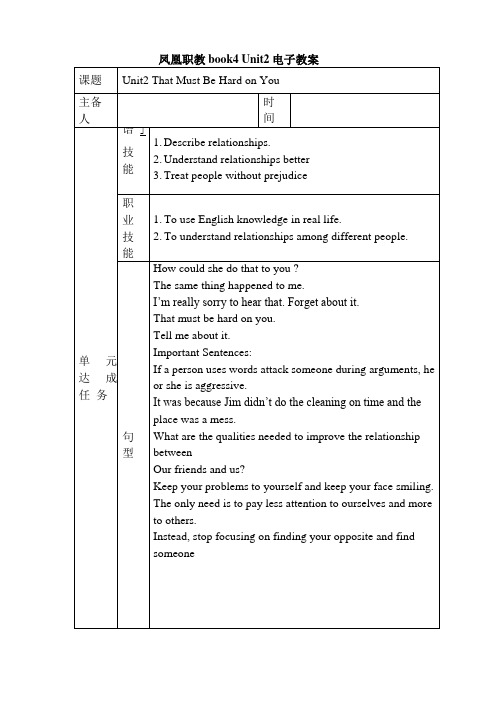
凤凰职教book4 Unit2电子教案Take students to read the picute of Parti and guesswhat’s happening to Jim.Listen to the conversation and circle what Jim is upset about.Then correct the answer.Listen again and complete the Part2 True or False.And tell the reasons to the class.Try to encourage to complete the part3 by themselves by using theinformation they have got in the before Twice’s listening.教学反思Stepl RevisionHave a dictaionSome important words: aggressive, gentle,patient,amazing, fun, bossy .....Students can describe their partners by the words we have learned last class.Step2 ListeningFirst listening:Take students to learn the three sentences and to know their chinese meanings.Listen to the tape recorder and find out the problem mentioned in each item.(Tell students to catch the key information when they are listening and take some notes.)Second Listening:Read the five sentences and try to complete the conversations with them.Ask two students to practise the conversations .Listen again and check their answers.some useful phrases:talk behind my back, all sorts of lies, ask him for help. Step3 Conversation StrategUnderstandingGenuine compassionMake you be in a similar situationBe a good listenerStep4. Work with a partner. Role-play the following e the conversation strategy in Acivity5. Situation 1: ......Situation 2: ......Situation 3: ......教学反思Ask some students to read the passageA one by one.Students can express that how to be friendly and charming by their own words. Complete the exercise 2 and check the answers with others.Step3 DiscussionWhat else can be done to improve friendships?Divide the students into several groups and talk with each other.教学反思different from themselves is a great relationship match. Be different from 与。
新视野 第三版 Book 4 Unit 2 B Making the choice to be truly beautiful

Inspiring your thoughts
Tips for finding topic sentence(s)
• The most common place is in the first sentence of a paragraph. • The second most common place is in the last sentence of a paragraph. • Sometimes, in the middle.
4. A topic sentence may end in a plural noun or contain a plural noun that is a general term for the supporting details.
5. A sentence that is followed by a statement with a contrast term is NOT the topic sentence.
Inspiring your thoughts
A. No. It is a fact with specific number. B. Yes. The statement indicates that some specific precautions against earthquake be listed and discussed as supporting details. It ends with the plural word “precautions.” C. No. It is a fact with specific number and name of a place. D. Yes, this statement mentions “steps” and indicates that the paragraph that includes it will provide specific steps for getting the driver‟s license.
新视野大学英语第四册Unit 2 book 4
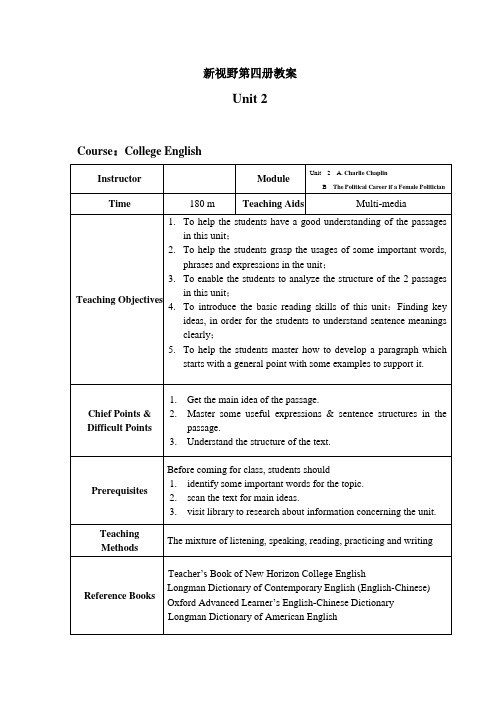
新视野第四册教案Unit 2 Course:College EnglishSection A Charlie ChaplinI. Warm-up Activity1. Topic Discussioni. Student‟s Discussion(Teacher asks students to discuss the topic on the passage.)1)What do you know about Charlie Chaplin?(open-ended)—He is a comic genius.—He is a person in pursuit of perfection.—He directed and starred many films.—Most of his films are silent.—He began working on the stage at 5.2)What did Charlie Chaplin look like in the film?—He often wore tiny moustaches, a tight coat, huge pants and tailcoats, oversized trousers and shoes, walking with a stick.ii. T eacher‟s SummaryCharlie Chaplin is a great comic for his native land Britain, but even more so for the world. On the stage he often wore tiny moustaches, huge pants and tailcoats that were perhaps more characteristic of Europeans and may be not much of the British. Since more than half of the roles Chaplin played were in silent films, people throughout the world had no difficulty understanding his films. With sound movies, Chaplin created a nonsense language that sounded like no known nationality and was accepted and appreciated by people all over the world. For most of his lifetime he did not stay in his mother country; he travelled throughout the world to appear on stage for people of different nationalities.2. Questions on the Topic and the Passage1) What do you learn about Charlie Chaplin‟s childhood from the first paragraph of the passage?— He lived a poor and miserable life during his childhood.2)According to the writer, why did Charlie Chaplin win greater popularity in other countries than in his own country Britain?—Because no one in Britain appeared to appreciate his talent of comedy. His comic figures did not conform to British standards.3)What do you know from the passage about Chaplin‟s film named ModernTimes?—It was the first movie in which Chaplin spoke.4) How did Chaplin usually create his great comedy?—He used his physical senses to invent his art as he went along without a preparedscript.5) What influence did Oona have on Chaplin‟s life?—She brought stability and happiness to him and became a center of calm in his family.II. Background Information1.Charlie Chaplin:(1889-1977) was a British comedy actor, becoming the most famous actor in the early to mid Hollywood cinema era, and also a notable director. His principal character was ―the Tramp‖: a vagrant with the refined manners and dignity of a gentleman who wears a tight coat, oversized trousers and shoes, a bowler hat, a bamboo cane, and his signature toothbrush moustache. Chaplin was one of the most creative and influential personalities in the silent film era: He acted in, directed, scripted, produced, and eventually even scored his own films. His working life in entertainment spanned over 70 years, from the British Victorian stage and Music Hall in England as a child performer, almost until his death at the age of 88. He led one of the most remarkable and colorful lives of the 20th century, from a Dickens-like London childhood to the pinnacled of world fame in the film industry and as a cultural icon. His high-profile public and private life encompassed highs and lows of both adulation and controversy.2.Monsieur Verdoux: is a character in the film entitled the same. He is an unemployed banker. While being both loyal and competent in his work, Verdoux is laid-off. To support his family, he periodically heads out of the town, marries wealthy widows and then murders them. This behavior eventually works against him when two particular widows break his normal routine.3. Modern Times is a 1936 film by Charlie Chaplin that has his famous little Tramp character struggling to survive in the modern, industrialized world. The film is a comment on the desperate employment and financial conditions many people faced during the Great Depression--- conditions created, in Chaplin’s view, by the efficiency of modern industrialization. It was written and directed by Chaplin. The film has been deemed ―culturally significant‖ by the Library of Congress and selected for preservation in the United States National Film Registry.4. The Gold Rush is a 1925 silent film comedy written, directed by and starring Charlie Chaplin in his Little Tramp ventures into Alaska looking for gold. He gets mixed up with some rough characters and falls in love with the beautiful Georgia. He tries to win her heart with his singular charm.5. The Pawnshop is a film in which Charlie Chaplin plays a shop assistant who competes with his fellow. When he is fired by the pawnbroker and rehired, he nearly destroys everything in the shop and himself.6. Mack Sennett(1880-1960) was an American silent film producer and director, perfected the art of slapstick in his ―Keystone‖series. During his lifetime he was known as the King of Comedy.7. Charlie Dickens (1812-1870) was an English novelist. During his career Dickens wrote many entertaining works which were immensely popular and displayed his rich imagination and comic genius. Now he is viewed as one of the major novelists of the Victorian era and an important documenter of life in those times.III. Text Structure AnalysisIn this passage the writer introduces us a famous figure, Charlie Chaplin, from different aspects: a general introduction to Chaplin, his artistic achievement, his emotional life and the end of his life story. The passage can be roughly divided into four parts.Part One(Para 1-2) These two paragraphs are the general introduction to Charlie Chaplin.Part Two(Para3-6) This part is about Charlie Chaplin’s artistic achievement. The four paragraphs deal with Chaplin’s success from his famous character ―the Tramp‖,to sound movies and his secret in making successful comedies.Para.3:It is about Charlie Chaplin’s huge success with his Tramp. Chaplin’s Tramp was a tremendous success, though many English people thought it a bit crude and not representative of the British. And Chaplin had no screen voice to confirm his British nationality.Para.4: It is about Charlie Chaplin’s success with sound movies. In sound movies Chaplin made up a nonsense language which sounded like no known nationality.Para5-6:It is about Charlie Chaplin’s secret of great comedy. Chaplin was an immensely talented man, determined to explore and extend his gift.Part Three (Para 7-8) This part is about Chaplin’s personal or emotional life. Chaplin’s emotional collision resulted in personal disaster in his early marriages butin his later years he found stability and affection in Oona O’Neill Chaplin, who gave him the love he needed.Para.7:It is about Chaplin’s emotional collision. Chaplin’s emotional conflicts resulted in personal disaster but found their way into his comic creations.Para.8: It is about Chaplin’s stable and happy life in his later years. In his later yearsChaplin found a partner, Oona O’Neill Chaplin, who offered him stability and affection. She gave him the love he needed.Part Four(Para9) After his death, his body was once stolen and the incident is taken as a memorial to the great comic of world fame.IV. Words and Language Points1 ankle n. the part which connects the foot to the leg 踝,踝关节My ankle is badly swelled.我的脚踝肿得厉害.The grass was ankle-deep.草深至脚踝处.<扩展> ankle joint 踝关节2 comica. causing laughter; funny喜剧的,滑稽的The comic scenes in the play were overdone. 这剧的滑稽场面太夸张了.His jokes provided some comic relief in what was really a dull speech.他说的笑话给极沉闷的讲话增加几分轻松气氛.n. a comedian喜剧演员This famous comic actor is loved by the people even after his death.这位著名的戏剧演员即便是在死后, 也仍受到人们的喜爱。
Book4 Module1 unit2 dialogue教学设计

能掌握课文单词短句句型,能背熟和表演本课对话,学会祝福别人,懂得尊重长辈。能描述生日会上正在进行的动作
Emphasis, Difficulties Analysis And Teaching Preview
板书并操练:forget/forgetting/forget something
编故事情景,事先找好一位学生T:Today iss birthday!Lets sing a birthday song.These are from me-a birthday card,a new computer game,Happy Birthday to you!板书并操练:happy birthday! Computer game
介绍学生自己生日会上的食物与参与的人员
Teaching Procedures
教学过程
1,《英语活动手册》U2 EX4,5
2,听读背U2课文及单词
Reflection or Notes
教学反思、随笔
课型
新授课
Objectives:
教学目标
教学资源
多媒体, 图片等
Preparation For Lessons
相关前置性学习
Period
课时
1
Type of lesson
重难点分析与教学预设:
本课的单词,短语与课文的学习
Teaching Resource
Book4 Module1 unit2 dialogue教学设计
Team
备课年级组
四年级
Designer
执笔
李维芬
Module
/Topic
最新(袁隆平)book4-unit-2-reading

He has helped China as well as the world get rid of hunger.
the main idea of the passage
The text is about Yuan Longping who made a great contribution to increasing rice harvest without expanding the area of the field, helping China as well as the world get rid of hunger.
3.According to the text,in 1950,Chinese farmers could produce only ________ million tons of rice.( C )
Afollowing are all Yuan Longping’s hobbies EXCEPT ________ . ( D )
2014年(袁隆平)Book4-Unit2-reading
Studying aims:
1.To know about agriculture and the basic knowledge of farming;
(了解农业和农作物耕种的基本知识)
2. To know about how to describe a person. ( 了解如何描述一个人)
2. What does the word “battle” refer to in the second paragraph? A. The low rice output. B. Ridding the world of hunger. C. Fighting against farming. D. The freedom to do research.
Kid's-Box-Book-4--Unit-2-Book-4-剑桥少儿英语第四册-2单元教案
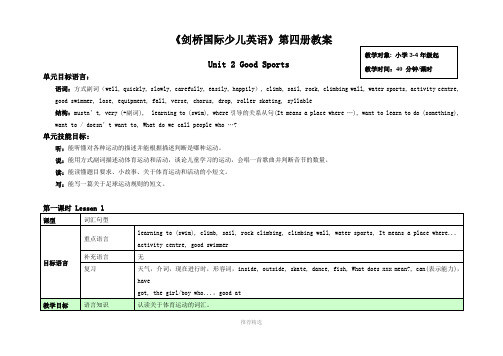
《剑桥国际少儿英语》第四册教案单元目标语言:语词:方式副词(well, quickly, slowly, carefully, easily, happily), climb, sail, rock, climbing wall, water sports, activity centre, good swimmer, lose, equipment, fall, verse, chorus, drop, roller skating, syllable结构:mustn’t, very (+副词), learning to (swim), where引导的关系从句(It means a place where …), want to learn to do (something), want to / doesn’t want to, What do we call people who …?单元技能目标:听:能听懂对各种运动的描述并能根据描述判断是哪种运动。
说:能用方式副词描述动体育运动和活动,谈论儿童学习的运动,会唱一首歌曲并判断音节的数量。
读:能读懂题目要求、小故事、关于体育运动和活动的小短文。
写:能写一篇关于足球运动规则的短文。
推荐精选推荐精选推荐精选推荐精选推荐精选推荐精选推荐精选推荐精选推荐精选播放录音:CD1, 23Group B tell them the best activity they can do bysaying “You can learn to …”. When you practise,I want you to “look up and say” and when you hear“Change”, the students in Group A do not move whilethe students in Group B move one step to your leftand practise with a new partner from Group A. 教师与一两名学生做示范。
人教版高中英语必修四(Book 4 Unit 2)
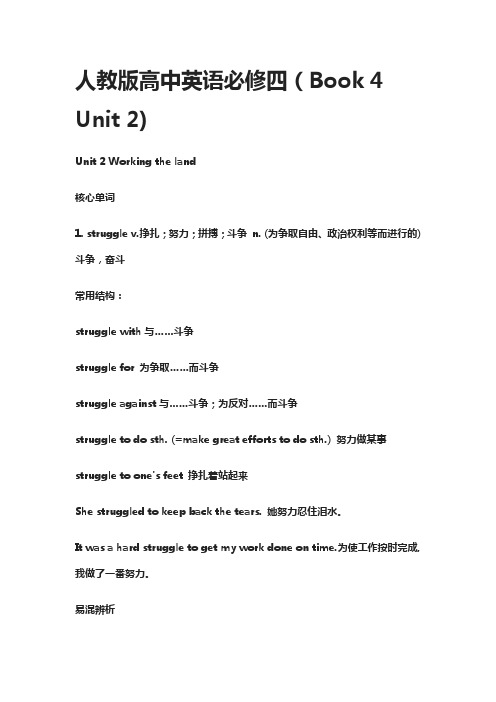
人教版高中英语必修四(Book 4 Unit 2)Unit 2 Working the land核心单词1. struggle v.挣扎;努力;拼搏;斗争n. (为争取自由、政治权利等而进行的)斗争,奋斗常用结构:struggle with与……斗争struggle for 为争取……而斗争struggle against与……斗争;为反对……而斗争struggle to do sth. (=make great efforts to do sth.) 努力做某事struggle to one's feet 挣扎着站起来She struggled to keep back the tears. 她努力忍住泪水。
It was a hard struggle to get my work done on time.为使工作按时完成, 我做了一番努力。
易混辨析struggle/fightstruggle指较长时间的、激烈的斗争,往往指肉体及精神上的战斗。
fight意为"搏斗,打斗,打架",表示"斗争"时,包含体力和勇猛的因素。
(1)单项填空The working people have never stopped their struggle_______________unfair treatment.A. againstB. forC. fromD. to解析:选A。
struggle against意为"同……作斗争";struggle for意为"为了……而斗争"。
(2)完成句子①我们应当帮助那些仍在为独立而斗争的人们。
We should help those who are still struggling for independence .②他们得和各种各样的困难作斗争。
They had to struggle with/against all kinds of difficulties(3)根据括号内的汉语提示补全下面句子。
- 1、下载文档前请自行甄别文档内容的完整性,平台不提供额外的编辑、内容补充、找答案等附加服务。
- 2、"仅部分预览"的文档,不可在线预览部分如存在完整性等问题,可反馈申请退款(可完整预览的文档不适用该条件!)。
- 3、如文档侵犯您的权益,请联系客服反馈,我们会尽快为您处理(人工客服工作时间:9:00-18:30)。
Lesson Planning
School:Junior or Senior Section: Senior
Teacher:Class: 11, Grade: one
Time: 40 minutes Material:Senior English For Schools Student’s Book 4 Type of lesson: writing Aids: computer
Contents: 1. V ocabulary: measure species degrade
2. Structure: non-restrictive attributive clause and finite verbs
3. Writing: Developing a Passage Based on a Profile
Objectives:
1. Instructional objectives (language knowledge and language skills)
1) Students manage to get key information from a text, then organize it for their writings.
2) Students learn to write a report of animals by organizing and analyzing given information.
2. Educational objectives (affect, learning strategy and cultural awareness)
1) Students develop the habit of appreciating English articles and gain the confidence by writing a short passage describing Baiji.
2) Students are aware of the importance of protecting animals, especially some rarest animals.
3. Personal objectives
1) To make students aware of the influence of pollution
2) To make students express their ideas using some complex sentences to improve their writing ability.
Focal points: Environmental Protecting
Difficult points:
1) The ability to get the key words in a passage
2) The ability of organizing a passage with a certain topic
3) The ability of using some complex sentences freely
Procedures and Time Allotment:
Stage 1 Imitation of the passage (10 mins) (arouse the interests of the Ss)
Step 1. Read the details of the description of the animal, try to be familiar with the structure of the text.
Step 2. Teacher provides another animal to set an example to students, ask students to write a brief description by imitating the text.
Stage 2 Pair work: fulfill the task 2 and get deep understanding of the table while discussing it.
(5 mins) (applying the reading ability )
Stage 3 Writing (10 mins) (applying the writing ability)
Step 1 Students write the short passage individually
Step 2 Self correcting to improve the passage using some advanced grammar and sentence patterns
Stage 4 Pear correcting (5 mins) (to strengthen group work )
Stage 5 Teacher correcting (8 mins) (proper analysis and guidance)
Stage 6 Assigning homework (2 mins) (consolidation) Step 1. Conclusion: the ability to get key information and organize it in a fluent passage.
Step 2. Homework: Choose whatever animals you like to write a short passage.。
